Living in Harmony

Valerie Harper (left) as Rhoda, Cloris Leachman (middle) as Phyllis, and Mary Tyler Moore (right) as Mary Richards, reunite in a scene from the last episode of The Mary Tyler Moore Show in 1977. All three were apparently good friends in their own lives as well.
Great harmony by Paul Simon and Art Garfunkel in a melancholy song.
For an all too brief period in the 1960s and 70s it wasn’t that way, and it seemed things would only get better. But “better” is a personal perspective, and apparently there has always been bubbling beneath the surface of humanity a foul stew of visceral hatreds and resentments. It was a delusion to think it had gone away. There were people for whom “better” was a bitter pill to choke down, upsetting to their righteous way of life, and they bided their time until they could turn back the clock. The general population always knew these people existed, and assumed they were a conservative minority whose grasp on power was slipping away and would eventually disappear. It turns out, however, that gender and racial resentments cross political party lines and their grasp on some people has strengthened, not weakened. Not everyone is as he or she seems, and while in public they may appear to tolerate new social norms, when they get home and start tweeting and facebooking, they release their bottled up anger and things get ugly.
Newscaster Ted Baxter, played by Ted Knight, was not mean-spirited like the internet trolls of today, merely clueless.
Live and let live. What is so very hard about hewing to that old maxim? If you have respect for yourself, respect for others will follow. One of the best features of Mary Tyler Moore’s two hit television shows, and by all accounts of her own personality, was respect for the characters and for the audience, which was reflected in intelligent, good-natured writing and presentation. The Dick Van Dyke Show in the 1960s was almost entirely put together by men, while The Mary Tyler Moore Show in the 1970s had more women writers than any other show before it. Both shows were excellent reflections of their times, though more optimistic and usually showing the better side of our natures. They were comedies, after all. They are still models of a better life for men and women.
Great harmony by Dick Van Dyke and Mary Tyler Moore in a happy song.
― Ed. 
